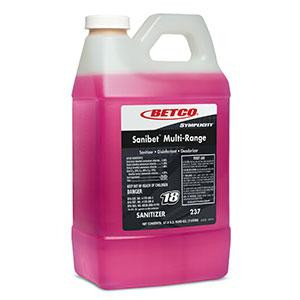FAQ About Decontaminating Surfaces Against COVID-19
How Do Betco Disinfectants Eradicate COVID-19?
Breaking through the exterior protein shell encapsulating COVID-19 viruses requires using special disinfectants that initiate a rapid cascade of chemical reactions within the virus. Once a disinfectant infiltrates coronavirus' genetic material, it destroys the viral genome and eliminates the ability of the virus to hijack a host cell. Molecular docking studies have recently shown that citrus flavonoids provide powerful inhibitory properties against viral infections and replications.
How Long Can Coronavirus Survive on Nonporous Surfaces?
A study conducted in January 2021 provides the most recent data regarding COVID-19 survivability on glass, vinyl, stainless steel and other nonporous surfaces. After 28 days of introducing coronavirus to nonporous surfaces, scientists found the virus remained detectable and viable. Alternately, COVID-19 was found to have less than a 24-hour survival time when introduced to cardboard surfaces. Copper proved to have the greatest effect on reducing coronavirus survival time, with 50 percent of coronaviruses placed on copper surfaces "inactivated" within only four hours.
Are Alternative Disinfection Methods Just as Effective as Betco Products?
The amount of high-intensity UV radiation required to inactivate COVID-19 may cause rash, dermatitis and other skin or eye irritations. In addition, UV radiation is a known carcinogen and can lead to triggering the kind of abnormally rapid cell production indicative of cancer. Moreover, no evidence exists to support the theory that sunlight kills COVID-19.
Betco’s Symplicity™ Sanibet™ Multi-Range Sanitizer safely sanitizes nonporous surfaces and does not pose a health hazard to humans or pets. All Betco disinfecting products can also be used on food preparation, storage and serving surfaces. The CDC states that surfaces should stay wet during contact time to optimize effectiveness. Recommended contact times are found on product instructions.
What is Residual Efficacy and Why is it Important?
Residual efficacy is the ability of a viral disinfectant to continue eradicating the virus long after applying the disinfectant to a surface. Products claiming to be "residual disinfectants" are asserting their product will begin killing coronavirus within 10 minutes of the virus coming in contact with the product. In addition, so-called residual disinfectants are supposed to remain effective for 24 hours. However, authentic "residual" cleaning products only prevent staining or odors for extended times. They do not prevent COVID-19 recontamination. For this reason, areas touched frequently by exposed human skin should be disinfected every two to three hours.
How Effective are Alcohol-based Hand Sanitizers for Preventing Transmission of COVID-19?
The American Journal of Infection Control affirms that hand sanitizers containing at least 60 percent isopropyl or n-propanol alcohol are the most effective hand disinfectants to use against COVID-19. When alcohol-based hand sanitizers are not available, the AJIC recommends washing hands with soap and warm water for at least 30 seconds. Although hand sanitizers with alcohol work faster to inactivate COVID-19 viruses, soap works just as well but simply take a bit longer. Soap molecules will insert themselves into the outer lipid layer of coronaviruses, pry the virus apart and damage it permanently.
Source Url :- https://sites.google.com/view/betco-corporation/home


Comments
Post a Comment